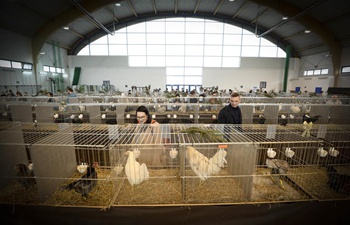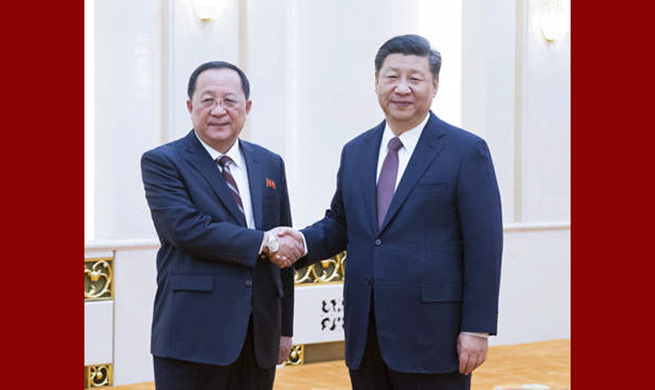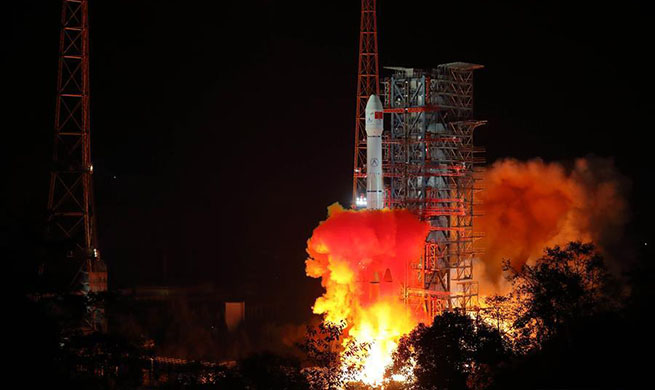by Marwa Yahya
CAIRO, Dec. 9 (Xinhua) -- Egypt's decision to adjust the customs dollar exchange rate for non-essential goods will benefit the Egyptian economy and protect national production, said economic experts.
Egypt's Ministry of Finance decided on Dec. 2 to keep the customs dollar exchange rate for essential commodities unchanged at 16 Egyptian pounds until the end of December, in a bid to ensure price stability and curb the inflation pressure.
The decision also adjusted the customs dollar exchange rate for non-essential and luxury goods to be determined as per dollar exchange rate set by the Central Bank of Egypt.
"The decision is a necessary positive step to improve the Egyptian economy that suffered deteriorations after the country suffered two uprisings since 2011," said Basant Fahmy, a professor of economy at Cairo University.
The government was dealing with the private sector that imports raw material from abroad with the customs dollar against 16 Egyptian pounds to encourage the industrial sector, said Fahmy, also a member of the economic committee in the Egyptian parliament.
However, the expert believes "it was unfair for the country to subsidize the luxurious and non-essential commodities."
The Finance Ministry has reviewed the rate every month since the Central Bank of Egypt allowed in November 2016 full floating of the Egyptian local currency to limit shortage of foreign currency.
The official exchange rate of the U.S. dollar then rose from 8.8 pounds to over 17.86 pounds at the moment.
Head of the International Monetary Fund (IMF) mission to Egypt, Subir Lall, told official MENA news agency on Friday the decision "will help improve the efficiency of resource allocation, including the foreign direct investment."
The decision's impact on inflation rates will be once and will be limited, he said, noting that the decision marks an important progress.
The previous customs practices, such as conducting transactions at fewer exchange rates included an unnecessary implicit subsidy, he clarified.
The customs dollar exchange rate had been fixed at 16 Egyptian pounds to the U.S. dollar for the past 13 months. It is used to calculate customs duties on imports.
The decision "helps increase revenues from value-added taxes on non-essential and luxury commodities," according to the Finance Ministry's statement.
These items include caviar, shrimps, lobsters, ornamental fish, parrots, alcohol, cat and dog food, cosmetic goods and cigars.
"Our goal is not only to collect more taxes, but also to encourage local industries by providing them with fair competition with imports," the ministry said.
"Exempting the staples necessary for the largest number of people reflects the government's keenness to strengthen social protection and protect social groups most affected by the economic reform program," he added.
The reason that the customs dollar exchange rate on luxury goods had been changed was the local currency had depreciated after floatation, Fahmy said.
The expert explained the decision is good at the technical level because when the exporters pay tax customs lower than the market value of dollar, it means the country is indirectly subsidizing their goods.
Fahmy added the decision will lead to increase of prices of some commodities by 10 to 12.5 percent.
Fahkry al-Fiqqy, former advisor to the IMF, agreed with Fahmy that the decision will alleviate the pressure on the dollar and will encourage national industries to grow and increase the tax revenues.
He added essential commodities such as wheat, oil and sugar could not be treated on equal foot with the luxurious unnecessary product with the same subsidy.
He added that the Egyptian imports has risen in 2018 to 65 billion U.S. dollars compared to 56 billion dollars in the previous year.
Still, al-Fiqqy sees some negative aspects concerning the application of the decision which will increase the prices of the cars that became essential commodities currently, especially after young men buy cars for services, such as Uber, to increase their income.
He added the Finance Ministry should review the list of luxuries commodities routinely because some unessential products in the past could be important today.
Meanwhile, Ihad el-Dosoqy, professor of economy at Sadat Academy for Administrative Sciences, described "the decision as negative because it will lead the rates of inflation up, as increasing some commodities even luxuries will definitely cause price hike of the other products."
El-Dosoqy added that setting two dollar prices for commodities will shake the nature of the exchange prices.













